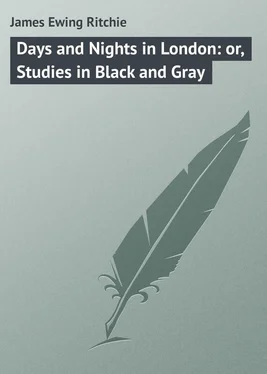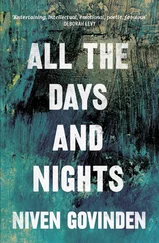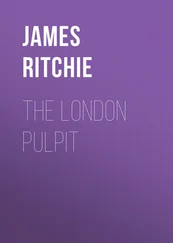James Ritchie - Days and Nights in London - or, Studies in Black and Gray
Здесь есть возможность читать онлайн «James Ritchie - Days and Nights in London - or, Studies in Black and Gray» — ознакомительный отрывок электронной книги совершенно бесплатно, а после прочтения отрывка купить полную версию. В некоторых случаях можно слушать аудио, скачать через торрент в формате fb2 и присутствует краткое содержание. Жанр: foreign_prose, на английском языке. Описание произведения, (предисловие) а так же отзывы посетителей доступны на портале библиотеки ЛибКат.
- Название:Days and Nights in London: or, Studies in Black and Gray
- Автор:
- Жанр:
- Год:неизвестен
- ISBN:нет данных
- Рейтинг книги:3 / 5. Голосов: 1
-
Избранное:Добавить в избранное
- Отзывы:
-
Ваша оценка:
- 60
- 1
- 2
- 3
- 4
- 5
Days and Nights in London: or, Studies in Black and Gray: краткое содержание, описание и аннотация
Предлагаем к чтению аннотацию, описание, краткое содержание или предисловие (зависит от того, что написал сам автор книги «Days and Nights in London: or, Studies in Black and Gray»). Если вы не нашли необходимую информацию о книге — напишите в комментариях, мы постараемся отыскать её.
Days and Nights in London: or, Studies in Black and Gray — читать онлайн ознакомительный отрывок
Ниже представлен текст книги, разбитый по страницам. Система сохранения места последней прочитанной страницы, позволяет с удобством читать онлайн бесплатно книгу «Days and Nights in London: or, Studies in Black and Gray», без необходимости каждый раз заново искать на чём Вы остановились. Поставьте закладку, и сможете в любой момент перейти на страницу, на которой закончили чтение.
Интервал:
Закладка:
From the prison returns we gather that the total of commitments to Newgate for the year ended September 29th, 1877, was 1,394 males, and 218 females, being in the case of the males a reasonable decrease from the last year’s numbers; to Holloway, 1,896 males, 281 females, the latter returns including 841 males and 45 females to the civil side for debt. Under the heading of expenses we have £127 19s. for new buildings, alterations, etc., in Newgate; and in Holloway, £199; ordinary repairs in Newgate came to £149 11s. 4d., rent, rates, taxes, etc., £121 7s.; Holloway repairs, £121 4s. 5d., rent and taxes, £74 2s. 11d., with various other charges, making a total of expenses at Newgate of £6,514 5s. 3d.; Holloway, £10,314 9s. 9d. From the table of funds charged with prison expenses we learn that at Holloway the net profit of prisoners’ labour was £2,038 1s. 9d. The county or liberty rates contributed £83 16s. 8d. to Newgate; the City rate was £5,632 1s. 3d., the latter rate was, in respect to Holloway, £6,239 5s. The Treasury paid £347 0s. 9d., proportion of the charge for convicted prisoners at Newgate, £1,438 17s. 6d. for those at Holloway.
The charitable contributions of England are to-day in excess of what the whole revenue of the British Crown was under the Stuarts, only two hundred years ago; over £600,000 per annum is derived from all such sources by the medical charities of London alone; more than 1,200,000 persons, exclusive of paupers, are annually recipient of assistance from those medical charities.
In other ways also is London truly wonderful. It seems as if the earth toiled and moiled to simply supply her wants. Sail up the Baltic and ask whither those vessels laden with tallow and corn and flax are steering, and the answer is, The Thames. Float down the Mediterranean, and the reply to the question would be still the same. Ascend the grand rivers of the New World, and the destination of the stores of beef and cheese and wheat is still the same. Canada supplies us with our deals; America with half our food; Australia with our wool; the Cape with our diamonds; the Brazils with coffee. Havannah sends her choice cigars, China her teas, Japan her lacquered and ingenious ware, Italy her silks; and from the vineyards of France, or the green hills that border the Rhine and the Moselle, we are supposed to draw our supplies of sparkling wine. Spain sends her sherry, Portugal her port. For us the spicy breezes blow soft on Ceylon’s isle, the turtle fattens languidly under burning suns, the whale wallows in the trough of frozen seas, the elephant feeds in African jungles, and the ostrich darts as an arrow across the plain. In the country village, in the busy mill, on sea or on land, it is the thought of London that fires the brain and fills the heart, and nerves the muscle and relieves the tedium of nightly or daily toil. As Cowper writes:
Where has commerce such a mart,
So rich, so thronged, so drained, and so supplied,
As London – opulent, enlarged, and still
Increasing London? Babylon of old
Not more the glory of the earth than she,
A more accomplished world’s chief glory now.
It is not our province to speculate as to the future. There are men who tell us that Babylon is about to fall, and that it is time for the elect to be off. It may be so. Time, the destroyer, has seen many a noble city rise, and flourish, and pass away; but London, it must be admitted nevertheless, never more truly in any sense deserves the epitaph of “wonderful” than at the present time.
II. – THE AMUSEMENTS OF THE PEOPLE
The Middlesex magistrates have shut up the Argyle Rooms. Mr. Bignell, who has found it worth his while to invest £80,000 in the place, it is to be presumed, is much annoyed, and has, in some respects, reason to be so. Year after year noble lords and Middlesex magistrates have visited the place, and have licensed it. Indeed, it had become one of the institutions of the country – one of the places which Bob Logic and Corinthian Tom (for such men still exist, though they go by other names) would be sure to visit, and such as they and the women who were habitués will have to go elsewhere. It is said a great public scandal is removed, but the real scandal yet remains. It is a scandal that such a place ever flourished in the great metropolis of a land which professes Christianity – which pays clergymen and deans, and bishops and archbishops princely sums to extirpate that lust of the flesh and lust of the eye and pride of life, which found their lowest form of development in the Argyle Rooms. It was a scandal that men of position, who have been born in English homes and nursed by English mothers, and been consecrated Christians in baptism, and have been trained at English public schools and universities, and worshipped in English churches and cathedrals, should have helped to make the Argyle a flourishing institution. Mr. Bignell created no vice – he merely pandered to what was in existence. It was men of wealth and fashion who made the Argyle what it was. The Argyle closed, the vice remains the same, and it will avail little to make clean the outside of the whited sepulchre if within there be rottenness and dead men’s bones. Be that as it may, there are few people who will regret the defeat of Mr. Bignell and the closing of the Argyle. It was not an improving spectacle in an age that has sacrificed everything to worldly show, and that has come to regard brougham as the one thing needful – as the outward and visible sign of an inward and invisible grace – as a charter of respectability to everyone who rides in it, whether purchased by the chastity of woman or the honour of man – to see painted and bedizened females, most of them
Born in a garret, in a kitchen bred,
driving up in broughams from St. John’s Wood or Chelsea or Belgravia, with their gallants, or “protectors,” to the well-known rendezvous, at a late hour, to leave a little later for the various oyster-rooms in the district, through a dense crowd of lookers-on, drunk or sober, poor or rich, old or young, as the case might be. In no other capital in Europe was such a sight to be seen. The lesson taught by such a spectacle was neither moral nor improving at first sight, and it was not well that a young, giddy girl, with good looks, and wishing, above all things, for fine dresses and gay society – sick at heart of her lowly home and the dreary drudgery of daily poverty – should there practically have learnt that if she could but make up her mind to give her virtue to the winds, there awaited her the companionship of men of birth and breeding and wealth, and the gaudy, if short-lived, pomps and splendours of successful vice. It is true that in the outside crowd there were, in rags and tatters, in degradation and filth, shivering with cold, pale with want, hideous with intemperance and disease, homeless and friendless and destitute, withered hags old before their time, whom the policeman shrank from touching as he bade them move on, who once were the admired of the Argyle, and the pets and protégées of England’s gilded youth; and here and there in the crowd, with boots in holes and broken hat, and needy coat buttoned as far as possible to the chin to conceal the absence of a shirt, with hands thrust in empty pockets, sodden in face and feeble of limb, were men who had been hauled from the Argyle to Bow Street and the gaol. It is true thus side by side were the bane and the antidote; but when did youth, flushed with wine and pleasure, pause on the road to ruin? Young says:
All men think all men mortal but themselves,
and in like manner each man or woman in the glow of youth feels confident that he or she can never fall, and thus rushes madly on, ignoring the eternal truth that there is a Nemesis ever tracking the steps of the wrongdoer, one from whose grasp we can never escape, that the pleasures of sin are but for a season, and that the wages of sin are death. By the beery dissipated crowd outside, I say, this obvious fact had been lost sight of. What they wanted to see was the women and the men as they turned out into the streets or drove away. Well, that sight exists no longer, and to a certain extent it is a gain. The Haymarket in these latter days was very different and a much more sober place than it was when the Marquis of Waterford played his drunken pranks at Bob Croft’s, or when the simple Windham was in the habit of spending his time and wasting his money and degrading an honoured name at such a place as Barns’s or The Blue Posts. Men not far advanced in life can remember the Piccadilly Saloon, with its flashy women and medical students and barristers from the Temple, and men about town and greenhorns from the country – who in the small hours turned out into the streets, shouting stentoriously, “We won’t go home till morning,” and putting their decision into execution by repairing to the wine and coffee rooms which lined both sides of the Haymarket and existed in all the adjacent streets. In some there was a piano, at which a shabby performer was hired to keep up the harmony of the evening and to give an appearance of hilarity to what was after all a very slow affair. In others the company were left to their own resources. At a certain hour the police inspector, with a couple of constables, would look in, and it was comic to see how unconscious he was apparently that every trace of intoxicating drink had been removed, as nothing remained on the tables but a few harmless cups of coffee. It was not till the industrious world had risen to the performance of its daily task that the rag-tag and bob-tail of the Haymarket retired to roost; and by the time that earls and holy bishops and godly clergy were ready to drive down the Haymarket to take part in meetings at Exeter Hall to send the Gospel to the heathen abroad, not a trace was left of the outrageous display the night before of the more fearful and sadder forms of heathenism at home. Undoubtedly the Haymarket thirty or forty years ago was an awful place; undoubtedly it will be a little quieter now that the Argyle Rooms are closed, and as the glory of Windmill-street has fled. Undoubtedly we have gained a great deal externally by magisterial action. Yet it is evident we need something more than magisterial sanction for the interference of the police. I am not partial to the men in blue. I doubt their efficacy as agents for moral reform or the introduction of the millennium. They can remove the symptoms, but they cannot touch the disease. It seems to me that they often interfere – especially in the case of poor women – when there is no occasion to do so; and no one, when it is requisite, can be more stolidly blind and deaf and dumb than your ordinary policeman. Police surveillance must mean more or less police bribery. It was once my fate to live in a country town and to belong to a library, which was also supported by the superintendent of police. On one occasion I had a book which had previously been in that gentleman’s hands. In opening it a letter fell out addressed to him. I did what I ought not to have done, but as it was wide open, I read it, as anyone would. It was from a publican in the town, begging the superintendent’s acceptance of a cask of cider. Of course, on the next licensing-day no complaint would be heard as to the character of that house. A journeyman engineer, in his “Habits and Customs of the Working Classes,” gives us similar testimony as he describes a drinking party during prohibited hours disturbed by the appearance of a policeman, but reassured when told by the landlord that he is one of “the right sort;” which means, continues the author, that “he is one of that tolerably numerous sort who, provided a publican ‘tips’ them a ‘bob’ occasionally, and is liberal in the matter of drops of something short when they are on night duty, will not see any night-drinking that may be carried on in his establishment as long as it is done with a show of decency.” I need say no more on that head; human nature is the same all the world over. Out of the heart are the issues of life, and no policeman or magistrate can make a drunken people sober, or a low, sordid, and sensual race of men and women noble and pure in thought and beautiful in life. For that we look to the Christian Church in all its branches. To its ministers especially we appeal. Let them leave theological wrangling, and the cloister where no living voice is heard, and the well-lined study in which human nature, when it puts in an appearance, has learned to assume a decent and decorous mask, and see what are the amusements of the people, not so much on the Sabbath-day, but on the week-night. The Argyle was but one place out of many. In our great cities there are tens of thousands who live only for amusement, whether they be the working classes or in the higher walks of life. A glance at some of these places of resort may help us to understand what are the amusements of the people, and whether the Church does well and wisely in stamping them with her approval, or regarding them with her frown. It is how a man spends his money, and not how he makes it, that is the true index to his character. It is really impossible to imagine amusements more foolish or more indicative of a low tone of mind morally and intellectually than those which are most patronised at the present day. What pleasure can there be in watching a man walking for a bet, or in a woman risking her neck on a trapeze? Yet thousands go to see such a sight. Even the theatres delight in displays equally revolting, perhaps more so from a moral point of view.
Читать дальшеИнтервал:
Закладка:
Похожие книги на «Days and Nights in London: or, Studies in Black and Gray»
Представляем Вашему вниманию похожие книги на «Days and Nights in London: or, Studies in Black and Gray» списком для выбора. Мы отобрали схожую по названию и смыслу литературу в надежде предоставить читателям больше вариантов отыскать новые, интересные, ещё непрочитанные произведения.
Обсуждение, отзывы о книге «Days and Nights in London: or, Studies in Black and Gray» и просто собственные мнения читателей. Оставьте ваши комментарии, напишите, что Вы думаете о произведении, его смысле или главных героях. Укажите что конкретно понравилось, а что нет, и почему Вы так считаете.












